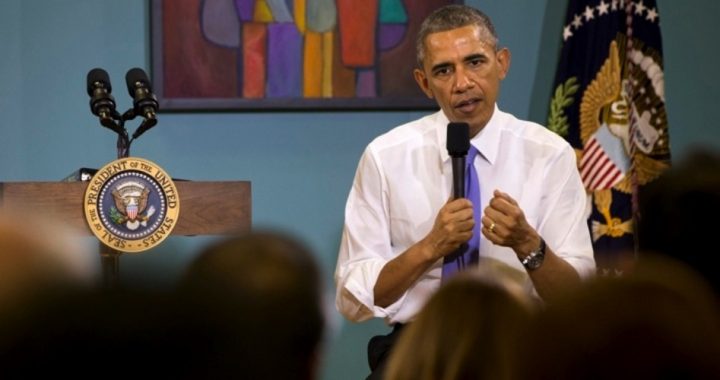
In a December 9 interview in Nashville with Telemundo’s news co-anchor, José Díaz-Balart, President Obama said, “We always knew that we could reprioritize some of our enforcement powers, not to simply eliminate deportations.”
After acknowledging that eliminating deportations is something “that only Congress could do [constitutionally],” Obama continued: “What we could do is change, given the limited resources we have, who and — who we’re going after and where our resources are deployed.”
Obama was responding to a question posed by Díaz-Balart in which the reporter reminded the president that in the past he had said that he didn’t have the authority to expand (beyond action the administration has taken previously by means of the Deferred Action for Child Arrivals [DACA] memorandum on June 15, 2012) on the mitigation of deportations.
Díaz-Balart asked: “Removing the issue of politics aside, what legally changed?”
Obama replied:
What, I think, changed is that having done what we did with DACA, with the DREAM kids, my argument was not that we did not have some additional authority, my argument was that I did not have the authority to simply not deport….
And there’s gonna be continuing — even after the actions I take, some deportations….
And I think it’s important for all your viewers to understand that the new executive actions we’ve taken apply to people who’ve been here for five years and who have U.S. children or children who are legal permanent residents. In that case, you can register, and you can be assured you won’t be deported.
When Díaz-Balart asked Obama if he is “actively looking into the possibility of further executive actions that could maybe help the people that did not qualify this time in the near future,” the president replied:
I asked the Office of Legal Counsel to give me their best ruling on how much legal authority I had. And we stretched as far as we could. You know, my hope is that this becomes a [spur] to action by Congress. If not, it’s certainly gonna be a conversation — going into the next presidential election and the next set of congressional elections.
The president was in Nashville for an immigration town hall meeting held at Casa Azafrán, a Nashville event and community center that is home to several community outreach non-profits offering various services to immigrants.
Díaz-Balart is currently the anchor for Noticiero Telemundo, the Spanish-language Telemundo network’s news program. He is also the brother of former U.S. Representative Lincoln Díaz-Balart (R-Fla.) and Representative Mario Díaz-Balart (R-Fla.) Mario Díaz-Balart was one of only seven Republicans who voted against the Executive Amnesty Prevention Act of 2014 (H.R. 5759) on December 4.
Prior to his interview with Díaz-Balart, speaking at a town hall meeting at Casa Azafrán, Obama was asked by a woman in the audience: “What is going to happen if the next administration decides not to follow the executive action?” The woman continued: “And I think many of the communities [are] afraid they are going to be first in line to deportation because they would give their information.”
Obama answered: “It’s true that a future administration might try to reverse some of our policies.” Continuing his answer, the president stated: “It would be foolish to try, as well as wrong to try. Any future administration that tries … would not have the support of the American people.”
Since practically all news reports and conversations made on the subject of Obama’s “executive action” are based on the assumption that the president issued an executive order to accomplish the goals he set forth in his November 20 speech, it is necessary to clarify what he did and did not do.
When we visit the White House website and look under the heading “Presidential Actions,” we find that the only executive order issued by Obama since his speech was one on December 6 proclaiming a December 26 holiday for federal employees.
What Obama did issue was a Presidential Memorandum on November 21 entitled “Creating Welcoming Communities and Fully Integrating Immigrants and Refugees.” That memorandum basically created a task force among all executive departments that “will help determine additional steps the Federal Government can take to ensure its programs and policies are serving diverse communities that include new Americans [immigrants].” The memorandum makes no distinction between legal and illegal immigrants.
While the memorandum was sent to all cabinet members, Homeland Security was given a lead role in implementing it, as it was charged with providing funding and administrative support for the task force and the secretary of Homeland Security was authorized and directed to publish the memorandum in the Federal Register.
Going down the chain of command, Homeland Security Secretary Jeh Johnson sent an executive action memorandum on November 20 to León Rodríguez, director of U.S. Citizenship and Immigration Services; Thomas S. Winkowski, acting director, U.S. Immigration and Customs Enforcement; and R. Gil Kerlikowske, Commission of U.S. Customs and Border Protection. The memorandum’s subject was “Exercising Prosecutorial Discretion with Respect to Individuals Who Came to the United States as Children and with Respect to Certain Individuals Who Are the Parents of U.S. Citizens or Permanent Residents.”
Briefly, the memorandum expands DACA by removing its age cap and extends work authorization to three years. Johnson’s order also expanded “deferred action” (another name for amnesty) by directing,
USCIS [U.S. Citizenship and Immigration Services] to establish a process, similar to DACA, for exercising prosecutorial discretion through the use of deferred action, on a case-by-case basis, to those individuals who:
• have, on the date of this memorandum, a son or daughter who is a U.S. citizen or lawful permanent resident;
• have continuously resided in the United States since before January 1, 2010;
• are physically present in the United States on the date of this memorandum, and at the time of making a request for consideration of deferred action with USCIS
The memorandum’s summary reads:
This memorandum confers no substantive right, immigration status or pathway to citizenship. Only an Act of Congress can confer these rights. It remains within the authority of the Executive Branch, however, to set forth policy for the exercise of prosecutorial discretion and deferred action within the framework of existing law. This memorandum is an exercise of that authority.
The Johnson memorandum effectively implemented the objectives that Obama outlined in his November 20 speech and, granted, was issued at the behest of the president. But, for the sake of accuracy, it is important to remember that Obama did not issue an executive order on immigration; Johnson did.
Photo of President Barack Obama speaking to attendees at Casa Azafrán in Nashville: AP Images
Related articles:
Immigration Speech: Does Obama See Himself as an Elected Dictator?
Obama and Republicans Spar Over Immigration Executive Action Plans
Obama Will Use Executive Action to “Spur” Congress on Immigration Reform
The Fate of “Immigration Reform,” Post-2014 Elections
Obama Pursues Plan to Implement “Immigration Reform” Unilaterally



